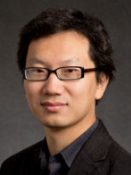Long wavelength longitudinal phonons can propagate in liquids, but whether transverse phonons exist in liquids has been debated since the 1970s. The classic hydrodynamic theory refutes the existence of the latter because the transverse current fluctuation does not directly couple with the density fluctuation and the Brillouin zone is not well-defined. However, such arguments fail to describe the viscoelastic response of liquids and glasses. Recently, we have developed a viscoelastic hydrodynamic theory by incorporating both viscoelasticity and anisotropy. As a result of the breaking of time-reversal and isotropic symmetries, transverse density fluctuations emerge in liquids and manifest in glasses, and thus we can interpret phonon delocalization as the microscopic driving force of the strongly-correlated behavior of supercooled liquids and glasses. We will also show evidences from coherent inelastic neutron scattering measurements and MD simulations. This approach not only provides a unified framework to describe the collective density fluctuations in liquids beyond the hydrodynamic regime but also serves as a generalized hydrodynamic theory for viscoelastic materials.

Y Z is an associate professor and a Donald Biggar Willett Faculty Scholar in Department of Nuclear, Plasma, and Radiological Engineering, Department of Electrical and Computer Engineering, Program of Computational Science and Engineering, Center for Biophysics and Quantitative Biology, and Beckman Institute of Advanced Science and Technology at University of Illinois at Urbana-Champaign. He is also the Associate Head of Department of Nuclear, Plasma, and Radiological Engineering. He received his B.S. in Electrical Science and Technology from University of Science and Technology of China in 2004 and his Ph.D. in Nuclear Science and Engineering from Massachusetts Institute of Technology in 2010. He was a Clifford G. Shull Fellow at Oak Ridge National Laboratory from 2010 to 2012. YZ’s research can be summarized in three words: Molecules, Materials, and Machines. His group develops accelerated molecular simulation methods to effectively model long timescale phenomena and rare events, with an emphasis on the liquids at interfaces and under extreme conditions. His group also advances the development of soft robots and human-compatible machines, robots in extreme environments, intelligent control algorithms, and understandable artificial intelligence. He has been recognized with several awards including, most recently, the Dean’s Award for Excellence in Research and the American Nuclear Society Landis Award. He is an associate editor of Science and Technology of Advanced Materials.
